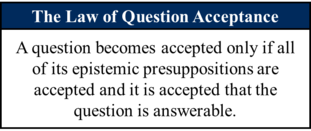Role of Employed Methods in Question Acceptance
Is the process of question acceptance affected by employed methods?
TODO: Nikki add a description
In the scientonomic context, this question was first formulated by Hakob Barseghyan and Nichole Levesley in 2021. The question is currently accepted as a legitimate topic for discussion by Scientonomy community.
In Scientonomy, the accepted answer to the question is:
- A question becomes accepted only if all of its epistemic presuppositions are accepted and it is accepted that the question is answerable.
Contents
Scientonomic History
Acceptance Record
| Community | Accepted From | Acceptance Indicators | Still Accepted | Accepted Until | Rejection Indicators |
|---|---|---|---|---|---|
| Scientonomy | 21 February 2024 | The question became accepted as a result of the acceptance of the respective modification. | Yes |
All Theories
If an answer to this question is missing, please click here to add it.
Accepted Theories
Suggested Modifications
Current View
In Scientonomy, the accepted answer to the question is The Law of Question Acceptance (Barseghyan-Levesley-2021).
Mechanism of Question Acceptance
The Law of Question Acceptance (Barseghyan-Levesley-2021) states: "A question becomes accepted only if all of its epistemic presuppositions are accepted and it is accepted that the question is answerable."
First, the law implies that the acceptance of a question is predicated upon the acceptance of all of its epistemic presuppositions. Importantly, the law works with the notion of epistemic presupposition, rather than logical presupposition, as it would be unreasonable to expect that all logical presuppositions of a question can ever be accepted. This is due to the inherent "explosiveness" of logical presuppositions: if question Q presupposes theory T1 and T1 logically implies theory T2, then question Q also presupposes theory T2. But since a theory can have an infinite number of logical consequences, a question can also have an infinite number of logical presuppositions. For instance, among logical presuppositions of the question 'What is the distance between the Earth and the sphere of the stars?' are not only theories 'The Earth exists' and 'The sphere of the stars exists', but also 'The Earth exists or God exists', 'The Earth exists or it is made of cheese', 'The sphere of the stars exists or God exists', 'The sphere of the stars exists or it is made of cheese' and so on.1p. 6 In contrast, the epistemic presuppositions of a question are not explosive as they are agent-dependent: "what can be a presupposition for one agent need not necessarily qualify as a presupposition for another agent".1p. 5 As explained by Barseghyan and Levesley:
A theory would count as an epistemic presupposition of a certain question for an agent, only if the agent is prepared to accept that theory when they accept an answer to the question, irrespective of what that answer is. Consider, for example an epistemic agent who, when accepting p, nevertheless does not accept p-or-q in order not to clutter their mosaic and avoid explosion. For such an agent, not all logical presuppositions of a question would count as epistemic presuppositions.1p. 5
Thus, for most agents, such theories as 'The Earth exists or God exists' and 'The Earth exists or it is made of cheese' would likely not be within the epistemic presuppositions of the question 'What is the distance between the Earth and the sphere of the stars?' if only because most agents wouldn't want to clutter their mosaics with such theories. Generally speaking, "for agents with finite epistemic capacities, a question always has a finite number of epistemic presuppositions".1p. 6
Second, the law stipulates that the acceptance of a question is also predicated upon the acceptance of a second-order theory that the question itself is, in principle, answerable. Thus, the acceptance of all of the epistemic presuppositions of a question is necessary but not sufficient for the question to become accepted.
Related Topics
This question is a subquestion of Mechanism of Question Acceptance.
References
- a b c d Barseghyan, Hakob and Levesley, Nichole. (2021) Question Dynamics. Scientonomy 4, 1-19. Retrieved from https://scientojournal.com/index.php/scientonomy/article/view/37120.
